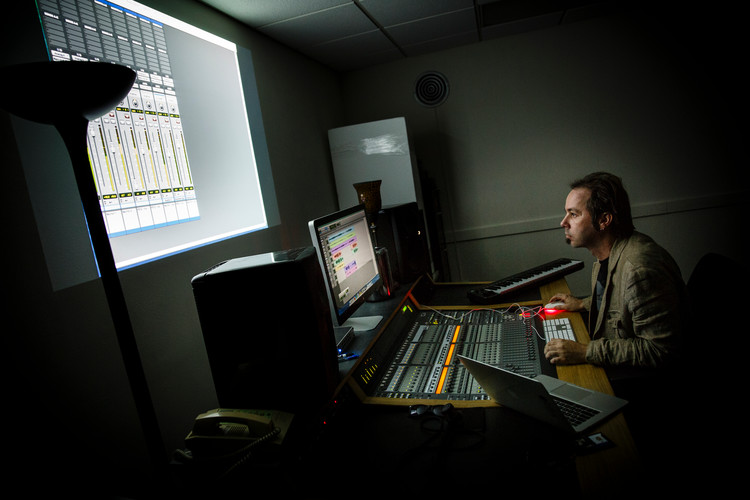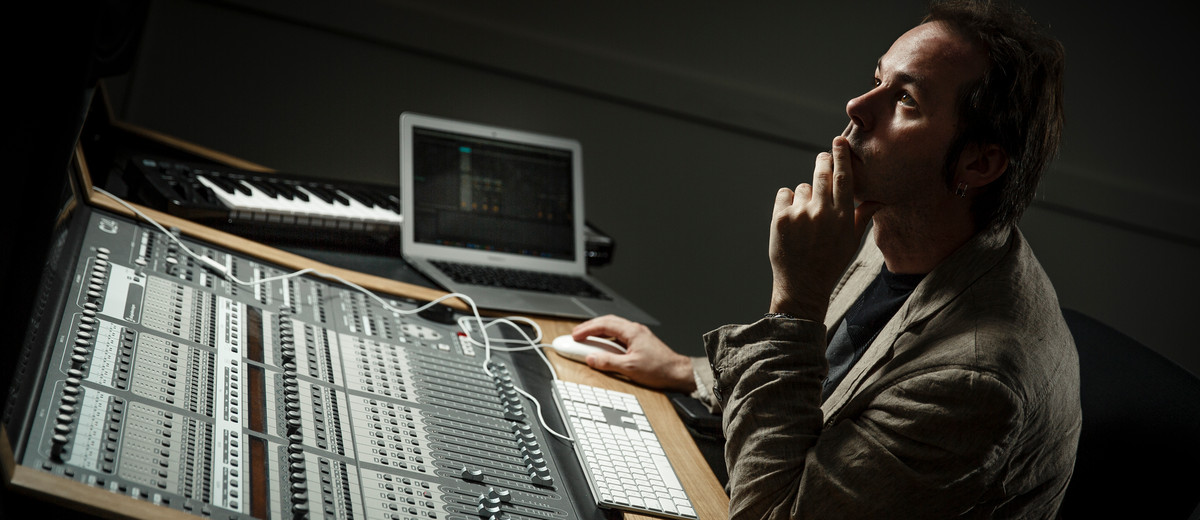What would you do if you had recurring dreams of someone shouting one bizarre word at you over and over again? Would you have a cup of coffee and shake it off? Would you turn on all the lights and assure yourself that "It was only a dream"? Or maybe you'd just shrug it off and go back to sleep.
If you're J. Anthony Allen, Ph.D., (the J. stands for Jason) you grab a pen and add the word to your already existing List of Nonsensical Words From My Dreams so you don't forget it. Then you compose a really rad, instrumental song inspired by it.
An orchestrated collision
For an electronic artist, like Allen, seemingly meaningless somnambulatory inventions provide fertile ground for producing music.
Last year Allen, an adjunct instructor in St. Thomas' Music Department (and also a composer of acoustic and chamber music), awoke from such a dream, the word "aniscorcia" – pronounced ann-i-score-sha, and not to be confused with anisocoria, a condition marked by unequally sized pupils – repeating in his head like a record skipping. More recently he dreamed the phrase "Jedi sombrero," but deemed it "too goofy to use."
"Aniscorcia," on other hand, embodied just the brand of convoluted aesthetic suited to his style of music-making; it is the working title for his forthcoming album, a compilation of electronic pieces he describes as "dance music by a guy with a Ph.D. in music."
With two master's degrees (and a doctorate) in music composition – one in classical, the other in electronic – Allen said many of his previous projects have been orchestral, with some of his works performed by the Minnesota Orchestra, the Aspen Conductors Orchestra and the Peabody Conservatory Orchestra in Baltimore. His newest work, however, is an orchestrated collision of both styles.
"I have this formal training as a classical composer, and then I have this deep interest in more dance music-type stuff, so for the last decade or so I’ve been trying to smash those together," he said. "Even in writing a string quartet that’s just traditional string instruments, for instance, I wanted to see if I could get them to groove and do some cool stuff. So this new project is more of that because that’s who I am whether I like it or not. It’s going to be smashing those two things that I’m most heavily influenced by together."
He added, "This time I’m leaning much farther toward dance music than I ever have. Some of it is club music-esque, and a couple pieces are pretty much like four-on-the-floor type of stuff – as in, four kick drums on every beat equals dance music. But then there are a couple really weird pieces and weird harmonies that are ... well, weirder dance music, you could say."

How it's made
The tools of Allen's electronic composition are unconventional in comparison to the instruments he used in the early, more classical, part of his career. To transform sound into music for his latest project, Allen used an array of gadgets housed in his custom-built home studio. In place of a piano, he used two keyboards: a Novation Launch Key and an Ableton Push. The latter looks nothing like a keyboard. Bearing close resemblance to an electronic educational toy from the 1980s, it's a square pad about the size of your average cutting board that glows by the light of 50 or so multicolored square buttons that each play different notes.
Also among his repertoire is an Ableton APC40, a large grid of knobs and buttons ("Knobs and buttons are good," Allen emphasized) that looks like something you'd find in a music studio, and a Jamstik – a new, Minnesota-made product that looks like a very small electric guitar and can sound like a guitar, piano and even an orchestra. He also composes on his iPad, on which he's downloaded an app called Spectrasync that lets the user "make crazy sounds based on your scribbles," Allen said.
Everything is connected to his laptop, which is loaded with Ableton Live, an editing and audio sequencing software program for composers.
----
Allen, who plays guitar and began giving lessons when he was 13, also teaches at MacPhail Center for the Arts and runs Slam Academy, a small school that offers courses in sound design, beatmaking, DJing and other areas. He also is owner of a start-up company called Eight Point that does audio forensic work.
Allen plans to self-release his album next year, when it will be available through iTunes and his website.







